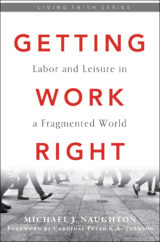By Michael Naughton
Dr. Michael Naughton is the director of the Center for Catholic Studies at the University of St. Thomas (Minnesota). He holds the Koch Chair in Catholic Studies and is a full professor in the department of Catholic Studies. Dr. Naughton also serves as board chair for Reell Precision Manufacturing. He helped coordinate and write the Vocation of the Business Leader issued by the Dicastery for Promoting Integral Human Development, which has been translated in over fifteen languages. He is the author, co-author, and co-editor of ten books and over fifty articles, including Getting Work Right: Labor and Leisure in a Fragmented World.

How can Sunday be a special day, a different kind of day? How can we mark it as a day of rest and celebration in the Lord?
There is no simple formula for developing the essential Sabbath habits, given the differences in circumstances and state of life in which we find ourselves. Still, we will want to find ways to institutionalize and ritualize the above three habits if we are to bring the power of the Sabbath into our lives. If we don’t consciously make space for them, the default response of the culture will take over, and we will find ourselves wallowing in a bland day of amusements and activities that fail to recreate. Here are some ways our family has tried to institutionalize Sabbath practices, although never perfectly and always needing our attention to keep them fresh.
Preparation during the Week: As with most people, if our family does not carve out time for something and plan it out, it doesn’t happen. My wife has a regular note in her calendar every Wednesday that simply reads: “Sunday.” The note reminds her to initiate a brief discussion about the coming Sabbath day. What Mass will we be going to? Who might we have over? What might we do for family time? Proper preparation for Sunday provokes a change in the way we handle our Saturday. We make sure we get weekend chores done on Saturday so that Sunday can be free of them. We try to avoid the kinds of Saturday activities—binge entertainment, staying up late, drinking too much—that will make celebrating on Sunday more difficult. We also prepare the house for the next day’s feast. On Saturday evening we dress the kitchen table with a runner, candles, a cross, a bible, and whatever else we might need for our celebration. If we are really planning well, we will get to Confession on Saturday afternoon, a practice that helps greatly in keeping the Lord’s Day holy.
Technology Fast: On Sundays, our family becomes “techno-sabbatarian.” We turn off our screens and give our devices a break. We have found that our smartphones connect us to everything but our souls, and often strangely remove us from the presence of the people next to us. This is not absolute but still a general rule. We may watch a film or a game together but still find that the less electronic devices present on Sunday the better.
Sabbath Prayer: We have added a ritual element to our Sunday by beginning the Lord’s Day with the lighting of an oil lamp and reciting a Sabbath prayer. This ritual is a powerful entrance into receiving the Lord’s Day and all its possibilities.
Mass: Given life’s complications, the simple act of getting to Mass can sometimes be a great achievement! In heading to Mass, we try to be conscious of the specific act of getting there, which is a little pilgrimage. We like to think of the people all over the world (as well as the saints and angels!) mobilizing to gather as the Church, one family in Christ. We remember that job titles, social prestige, and positions related to wealth and privilege are put aside when we gather together as brothers and sisters equal before the Lord. Sharing the Eucharist together is at the heart of our Sunday. According to the Church, the Eucharist is “the source and summit of the Christian life,” so we try to make it the source and summit of our lives as well with the high point on the Sabbath day.
Sabbath Walk: We try to find a time each Sunday to take a walk together as a couple and if possible as a family. Depending on the circumstances of the day, we do this either in the morning before Mass or in the afternoon just after brunch. Whatever the time, it is always good to get outside. Walks are opportunities to talk together as well as to be silent. In the middle of our walk we usually pray the rosary. All sorts of surprising and sometimes difficult things arise during these walks, but we have never regretted taking them.
Feast/Brunch: Eating together is a very important part of our Sundays, although it is important that no one is overly burdened by meal preparation. We also take our time over our meals. We Americans can learn things from the Italians and other Europeans who take their meals in courses, one dish at a time. Meals are more leisurely and provide time for conversation and the renewing of relationship.
Play/Games/Activities: Sunday is also meant to be a time of joy and play. This can take a wide variety of expressions. We like board games, especially the kind that invite conversation. Our family’s competitive spirit can sometimes get the best of us, and our games can turn into pitched battles. Other activities might include crafts, sports, picnics, canoeing, parks, the zoo, and music.
Charity/Volunteer: I remember that when I was a kid, our family would often visit the elderly on Sundays, especially those with no relatives. In particular, I remember going to Mrs. Delaney’s house. The free time of Sun day provides an opportunity to visit people in a way that is not rushed or perfunctory.
The above list is a snapshot of our family Sunday keeping. There are many ways to incarnate Sabbath habits, and lots of room for creativity in finding the best way to live Sunday. Whatever pattern we may develop, the point is to help us to set aside the Sabbath day as a special gift to us, one with the capacity to foster our ability to truly rest, to celebrate the goodness of God and the world, and to revitalize our relationships with the most important people in our lives.
You Might Also Like

The divided life is a temptation so built into our society, we may not even recognize it. Yet most of us fall prey to it. We either undervalue work, resenting it as simply a job, or we overvalue it as an identity-defining career. Michael Naughton, drawing on his background in both business and theology, proposes that the key to finding balance is another important human activity: leisure. In light of leisure—not mere amusement, but time for family, silence, prayer, and above all, worship—work becomes a space where men and women can find deep fulfillment. Naughton provides real-world examples of how businesses can promote authentic human flourishing and innovation through practices and policies that support leisure.
In Getting Work Right Michael Naughton will change how you work—and rest.